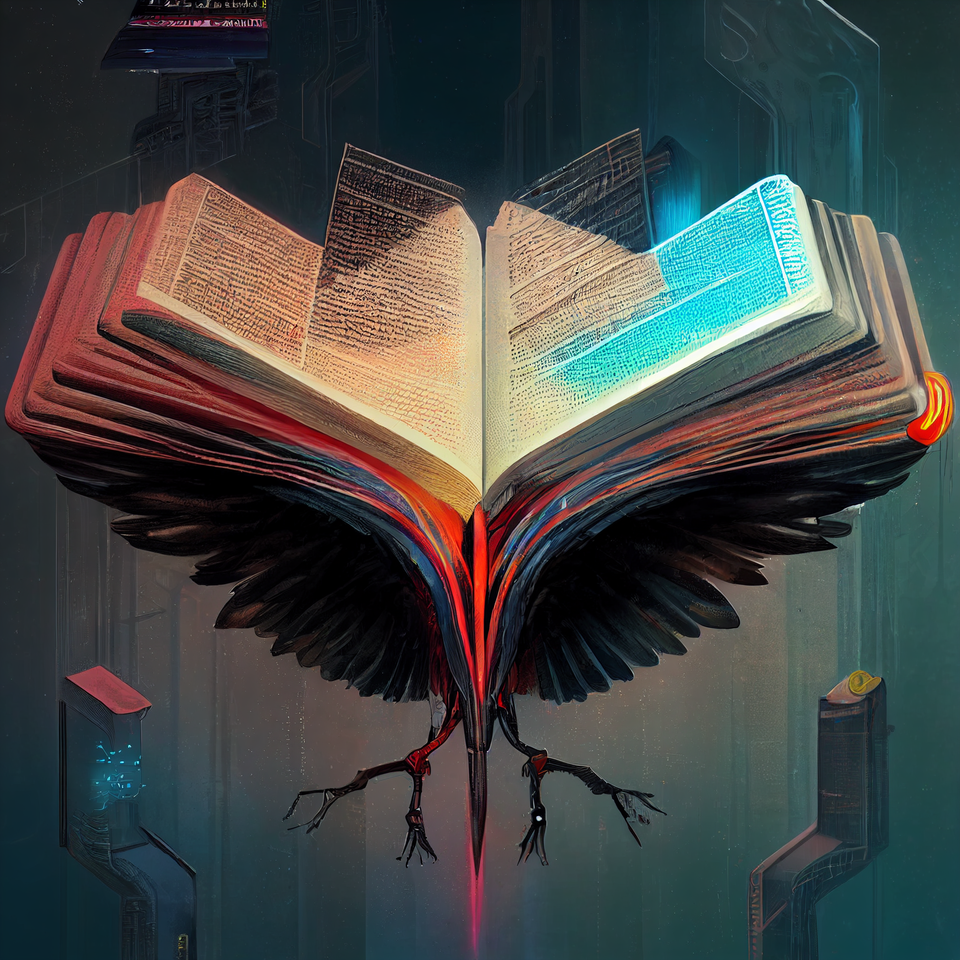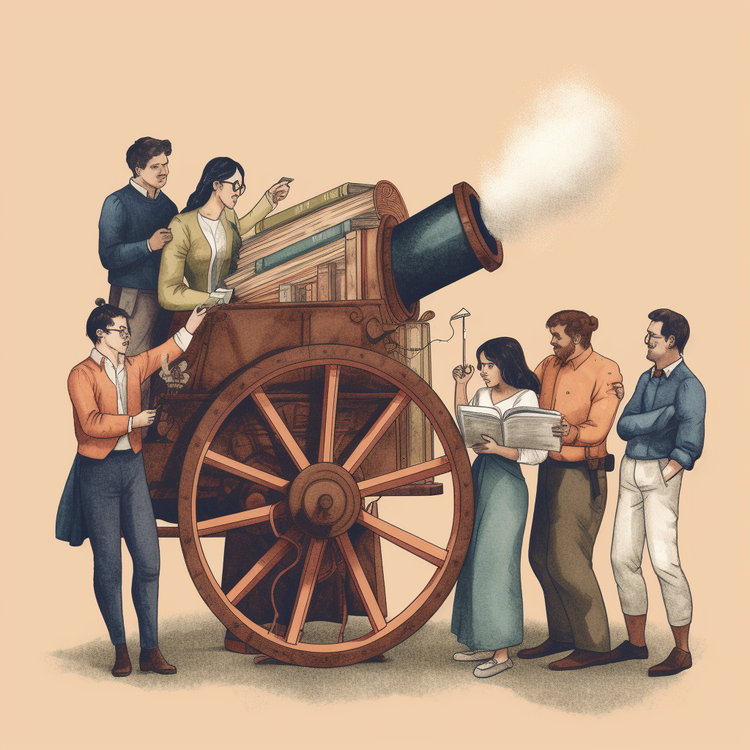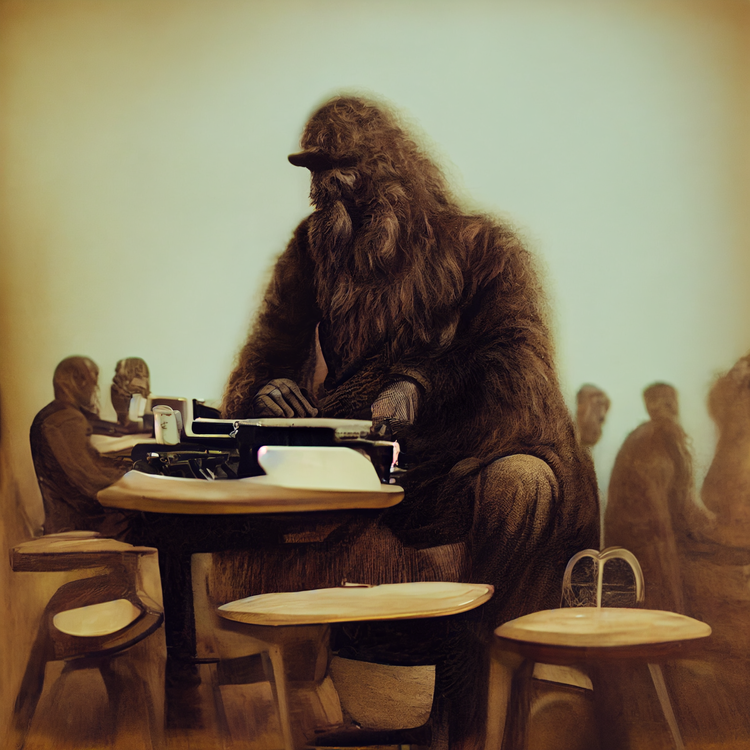The Future of Books, or the Books of the Future

What's A Book?
What do you think of when you think of a book?
Perhaps you envision a manuscript, hand illustrated (aka "illuminated") work of art, each unique. Or perhaps, since you were likely born after the inventing of the printing press (and if not, let's talk!), you think of something a little more common.
Perhaps a hard cover text book, a small mass market paperback, or something in between.
Or maybe a nice e-book! Those are pretty cool new inventions, am I right?
Something that I noticed as I went through a quick history of books: we focused on how easy large numbers of books were to create. That makes sense, right? We want to get as many of our books as possible into the hands of readers! So we figured out how to make the same thing over and over, for a small price. And the price is falling more and more. Which is a little weird, because the effort of writing a book hasn't changed much, right?
Are we pricing authors out of the business?
Not really. The nice thing about a book is that it's a product: you can create it once and sell it as much as you want. The contents of the book can be stored electronically, so the storage cost is effectively zero. And now, we've got print on demand services, so you don't even need to print books until you sell them.
This means that you don't need anything to write a book now, other than perhaps a computer to type on (at least at some point, you can even write things by hand to start!) and maybe an internet connection.
Of course, you didn't need much to write a book before, but publishing, that was another thing entirely. In order to publish a book, you likely needed a publisher, right? They would help you with the logistics of getting the book edited, published, stocked on store shelves, sold, etc.
And they would take their cut. Since there were limited resources available, they would have to figure out whose books would sell the best, because their outcomes were likely also tied to sales. They'd get some percentage of sales down the road.
They would take on a lot of the burden of selling the book, because they stood to benefit (or not) from the sales (or lack thereof) of a given book.
Fast forward until now.
I touched briefly on the state of the world now. We don't need much in order to write a book.
But now, we also don't need much in order to publish one.
I could write up a book over the next week, just cranking out page after page after page. Wouldn't even have to be words. Could just be 4000 pages of the letter 'e'.
And I could pay someone to print that for me.
They would gladly take my money, charge me some large amount for shipping, because that's a large book, and send it where I asked them to.
But why would I do that? I probably wouldn't, because there would be nobody who would buy that book. See, there's more to it than just writing.
I don't just write for me. I write in hopes that others will read what I have to say. Granted, I get a ton of benefits from writing, even if nobody reads anything, because it helps me clarify my thoughts and I enjoy it.
But there's also a part of me that would love to be a bestselling author. I'd love to have written words that thousands, if not millions, of people, have read. How cool would that be?
So that means I've got to also sell my book. And that's a lot tougher. What does it take for a book to be sellable? I've got some ideas, but I won't know for sure until I manage to create one.
What would lead to me creating a book that's sellable?
- A Cool Topic. I've gotta write something interesting. I think the future is pretty damn cool, and I think that a lot of people are going to be economically incentivized to think a lot about what the future holds in the coming years and decades. I'd say I've got a pretty good start here. Current grade: B+
- Unique Insights. Are these necessary? Probably not, actually. In fact, the more unique the insights are, the more likely they will not be popular. That will result in fewer book sales. Unless those insights turn out to be true over time. Then, I could see the sales of the book going up, especially as people start to read it, get inspired, and then share that the book inspired them to do something. I'm not willing to say that I've got any specific unique insight, as I'm not that conceited, but I do think I've got a collection of insights that is unique, based on my lived experience. In fact, I think everyone does. But my collection happens to be based a lot on technological trends, so that's where I'll tend to spend my time writing. Current grade: A+.
- An audience. This is not technically necessary for selling a book, especially if you get yourself one of those fancy publishers. But let's say I'm greedy and I want to manage everything myself. Then I'll need distribution channels. And the easiest distribution channel is an audience that trusts me and already believes in what I am saying. I won't need to spend a lot of time convincing them to trust me, because that's why they are in my audience in the first place. They like hearing what I have to say. Or they hate hearing what I have to say and want to dunk on me as soon as I write anything. Hey, I'm not above hate reads. Reads are reads, amirite? Not doing so well on this yet, but I've started, with a small but strong audience. Current grade: D+.
- A book. If I want to sell a book, I probably need one to sell, right? Actively working on that, so that's not bad. Or do I need an actual book? I probably only need some words written. Can I sell a future book? That's quite possible. There are a lot of writers who sell their words in a bunch of different ways, before they actually have a book to sell. Sometimes, they run a course. Sometimes, they tweet. Sometimes, they build a business. I'm doing all of that at once, and writing the book as I go. But that's given me a few ideas of ways that I can go. We'll toss that in the middle. Current grade: C
Let's go back to the original question. What's a book?
A book is a collection of ideas, information, data, knowledge, opinions, and so much more. And it is packaged in a consumable format that people will pay for, ideally.
They used to be printed on paper, as that was the cheapest way to create a bunch of them, which can then be used as one way to optimize profits for everyone involved in the process. That's a lot different than it was when books were rare, because at that point, they were used to pass down the most important knowledge. The closer the cost of production got to zero, the more focused on profits the goals became.
That's what happens when we focus on the mass production of anything. Because the individual units become meaningless, so instead, we focus on other aspects of what we are producing. Usually, how many of them we can produce at a given cost. It becomes about the numbers instead of the knowledge.
Until we hit a saturation point. At some point, everything becomes so homogenized, so algorithmically defined, that we start looking for the novel, the unique, the different. That's what stands out.
Instead of the decorations at Ikea, we start finding hand-crafted antiques. We find the illuminated manuscripts instead of the mass market paperback.
We find the things with the imperfections of craftsmanship instead of the perfection of factories.
That's what becomes valuable. That's what become highly sought after.
So will books head the same way?
As I've been researching, as I've been thinking, I've been looking for what the book of the future looks like.
And that's the most amazing thing about all of this.
The whole reason I'm writing this book in the first place.
Because the book of the future is whatever I can imagine, now.
If I can make it happen, that's what my book of the future is. And even if nobody else's book is done the same way, I made that future a reality.
And that's the most powerful lesson of this whole book. The future is what you make of it. I'll show you the tools that are available, the ones that are being developed, and some likely ones that might exist in the future.
But the future is yours to craft as you will.
What's a book?
My book is a video game, a product, a course, a podcast, a live stream, a collectible, a community. It's an interactive exchange of knowledge that you'll eventually be able to print out to showcase on your shelf or stash on your Kindle.
Your book will be up to you, in ways you never thought possible.


Member discussion